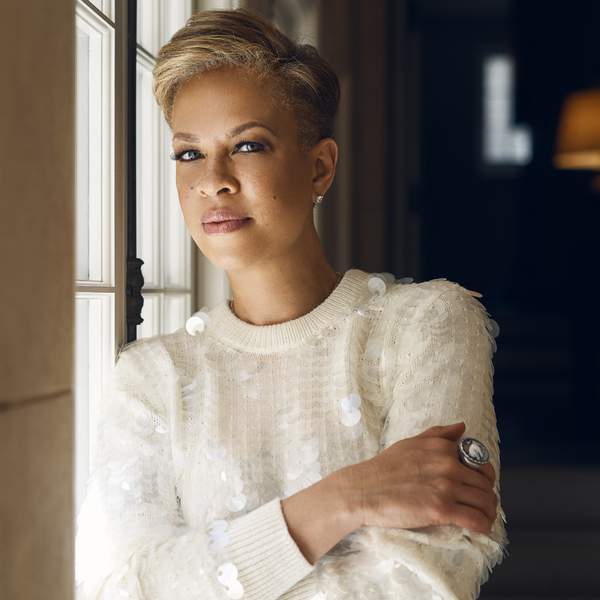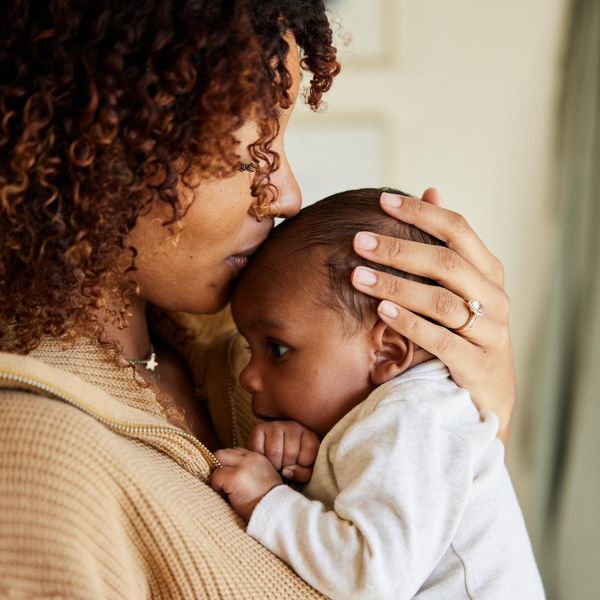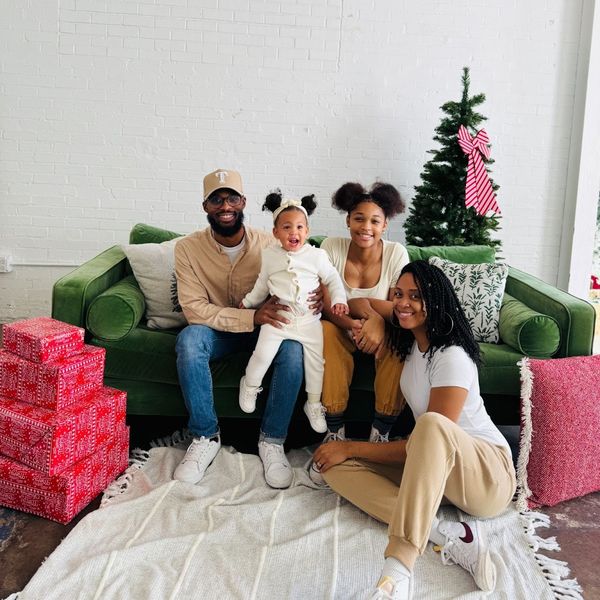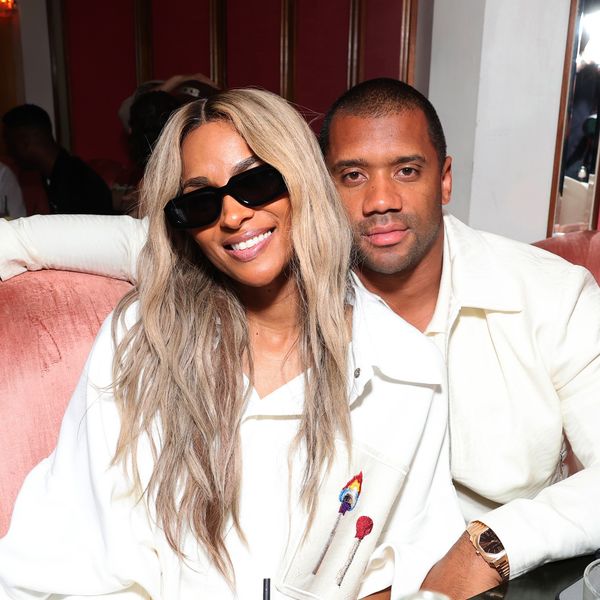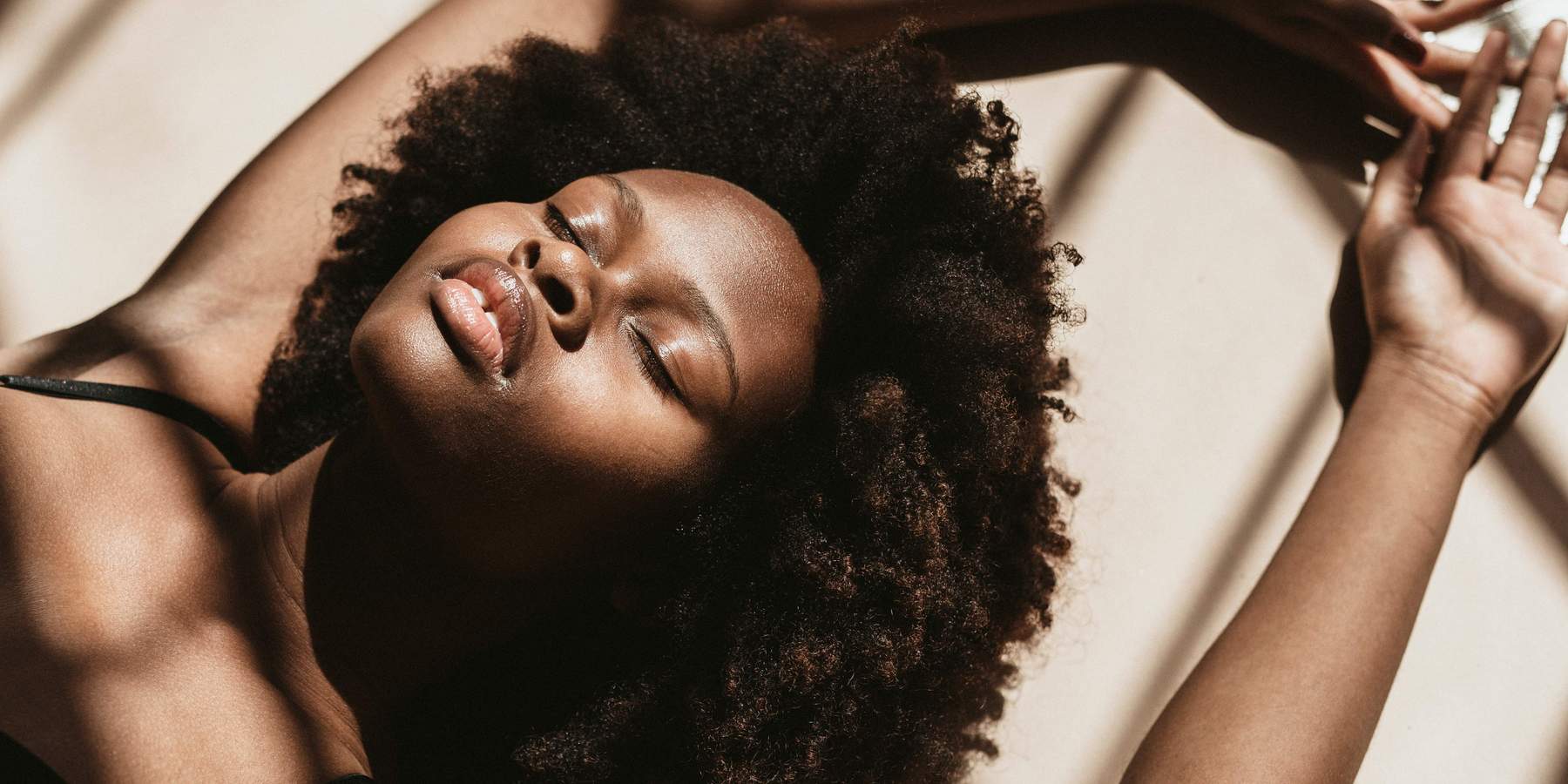Black women take center stage in April, celebrating International Black Women's History Month. In addition, April 11-17 sheds light on Black Maternal Health Week to raise awareness of the disparity of mortality rates among Black women compared to their non-Hispanic white counterparts. The discussions surrounding Black maternal mortality are becoming more mainstream with Baby Dove joining Sista Midwife Productions, "a birth advocacy, training, and consulting agency," to comprise a comprehensive list of the Black Doula Directory.
Tonya Lewis Lee has become a staunch advocate of ensuring that the American public is cognizant of alarming statistics that show "Black women are three times more likely to die from a pregnancy-related cause than White women" even though 80% of "pregnancy-related deaths in the U.S. are preventable," according to the Centers for Disease Control and Prevention. Bias, racial and gender inequities are prevalent in the American healthcare system, including other disparities such as "quality healthcare, underlying chronic conditions, and structural racism," all impair marginalized patients from having the same opportunities to receive care to uphold their "economic, physical, and emotional health," the CDC reports.
According to the organization's report, approximately 700 women die in the U.S. from pregnancy or various other pregnancy-related complications. Recently, in Detroit, Michigan, Alona White, a 25-year-old mother, died after giving birth to her second daughter; White succumbed to an emergency craniotomy that caused her brain to bleed. As a patient at Ascension St. John Moross, White underwent a C-section, a medical procedure that Lee’s documentary Aftershock also explores and shows the financial benefits hospitals and doctors reap from this particular surgery, even though it may not be conducive to the birthing process.
Lee, who co-directed and co-produced with Paula Eiselt, discusses through her documentary Aftershock about Black maternal health and places several human faces to those victimized by this growing health crisis. The Hulu doc, which is a part of the streaming service's Onyx Collective, initially premiered at the 2022 Sundance Film Festival in the U.S. Doc Competition and was awarded the Special Jury Award: Impact for Change. Aftershock follows Omari Maynard and Bruce McIntyre, who both lost their partners, Shamony Makeba Gibson and Amber Rose Isaac, during childbirth, and how the two men, along with other family members, are in the streets providing advocacy and activism to eradicate this epidemic.
Using her background as a former human rights attorney, a spokesperson for the U.S. Department of Health and Human Services Office of Minority Health, and an author of the children's book Please, Baby, Please—which she co-wrote with her Academy awarding-winning husband, Spike Lee, she uses her platform to heighten the conversation of Black maternal health.
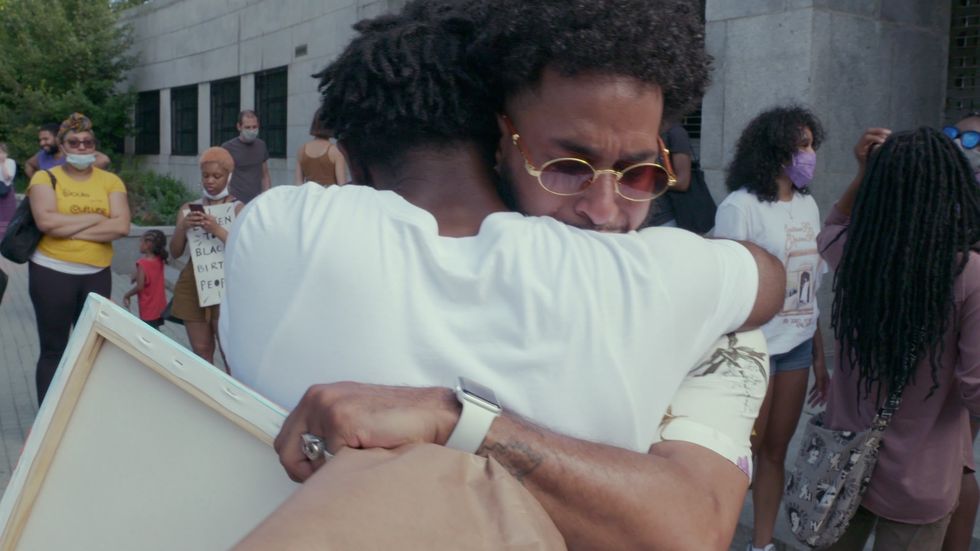
L-R Omari Maynard and Bruce McIntyre
Photo courtesy of Onyx Collective
xoNecole: Based on your research, what are the factors causing Black women's death in most hospitals? The documentary did expound on it, but if you can say it in your own words.
Tonya Lewis Lee: First, I want to say that most of these deaths happening with Black women from childbirth complications are preventable. When we were making the film, 65% of these deaths were preventable. Since then, a new statistic has come out that says 85% of these deaths are preventable. When you asked me what we discovered in our research about why this is happening? First and foremost, what keeps coming through is very clear that Black women are being dismissed and ignored when they express pain or discomfort or something is not right. A lot of these deaths are postpartum.
It's frustrating because it's not like women aren't seeking help, as you see in Aftershock. The two families that we cover, the two women who passed away, each of them were seeking help from their healthcare providers. Unfortunately, their calls for help were dismissed, minimized, and ultimately led to their death. I will say that what tends to happen is there is either too little intervention too late, or there tends to be too much intervention done too soon, which, unfortunately, often causes these deaths.
xoN: Is this something that residents are taught in medical school because, like the doc pointed out, the founder of gynecology J. Marion Sims, believed Black women don't feel pain? Is this ideology still continually introduced in medical schools?
TLL: My understanding, and I've heard, anecdotally, that it is still taught in med schools today that Black people do not suffer or have the same kind of pain that white patients do, which is insane to me that we're still having these conversations. I empathize with doctors because I think they are trained in such a way--it's a patriarchal, technocratic system. They go through rigorous training, which is great, but they're also kind of dehumanized doctors, when they're going through a process so that by the time they get to their patients, they often inadvertently treat their patients in the way they have to rush, let's get through to the problem. What's the problem? Let's solve it.
I'll go back to the question you asked before about what's causing these deaths also, is that [birthing] is not woman-centered, and what I mean by that is, when a woman is giving birth, as opposed to listening to her desires and how she wants to give birth and who she needs in the room, what is she doing and how is it working for her? Unfortunately, a lot of times, it's more on the doctor's schedule, what works for the doctor, and what's efficient for the doctor. Why do we lay on our backs and put our legs up? Well, because it's easier for the doctor to get in there than allowing a woman to move around during her labor to help the baby work its way down. So the baby gets in position, and she's able to do what she wants to do. I think that a lot of education works against the natural birthing process.
xoN: Regarding the medical schools, is there any way we can change how they're instructed? How can we upgrade their curriculum on how they handle Black maternity?
TLL: I agree with you, and I will say, at least some of the good news; I see that with Aftershock, we've been invited by medical schools to bring the film. We were at Harvard and Columbia [to show the film] to their residents and converse with me, my co-director, and the film's protagonist. To your point, they need to be educated; differently, they're beginning to understand that and are looking at it [but] it's going to take a little bit of time to turn the ship. But at least there's a conversation that is starting to happen, but I completely agree with you that med schools need to start thinking about how they teach maternal care.
And again, even the midwifery programs, too, because I am a big advocate for midwives. Yet, they're not enough midwives in general in the United States, and they're certainly not enough Black midwives. So, to that point, we also need to work on the pipeline of doctors, obstetricians, and gynecologists, because there's a shortage of doctors. There's a shortage of nurses, and certainly Black nurses and doctors. We want to think about who's going to med school and how we cultivate them so that we have a workforce that can care for all of us.
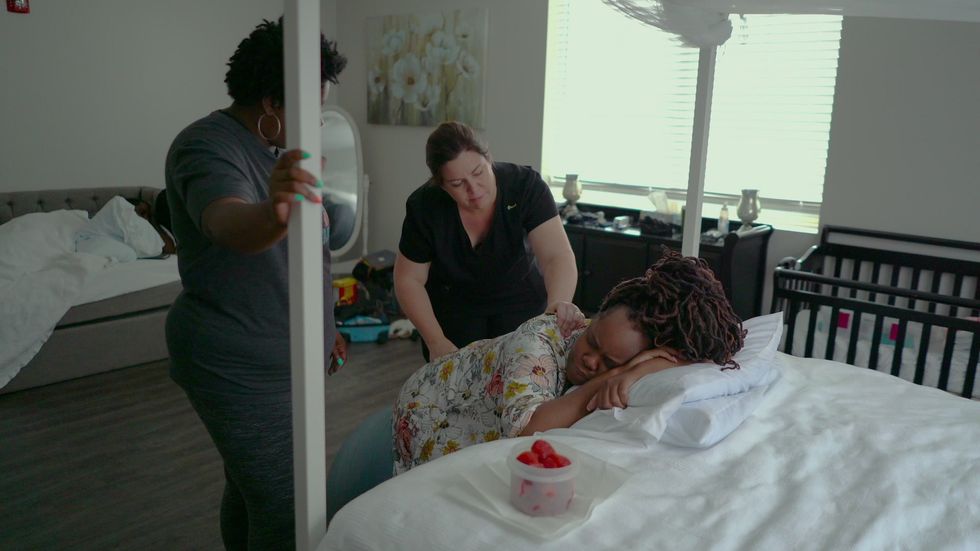
Photo courtesy of Onyx Collective
xoN: To add to that point, maybe there should be a movement to have Black owned hospitals. Many Jewish communities have their own doctors and ambulances. Is that also something we need to start putting on our agenda to start creating Black-owned hospitals in these cities with a high Black population?
TLL: I think we can [have] Black hospitals; we're talking about education in general. Our issue as a community is whether we need more resources or we need to focus the resources in that way. It's worth thinking about. Looking to our HBCUs, our Black students, bringing them through to get us to a place where we could create that kind of thing. I don't think it's a bad thing. A study showed that when Black doctors treat Black infants, they have better outcomes. So I think a movement towards ensuring that we have more Black doctors, more Black nurses, a robust Black health care system to begin with, or at least doctors. Having an awesome Black hospital that's important for us would be amazing because we do not have the resources to do that.
xoN: How can we change policy as it relates to the health of Black women when they're giving birth? What can we do?
TLL: Well, the good news is policies are moving through Congress right now, the Momnibus bills, its pieces of legislation, a group of bills. One in particular that is great that I believe recently passed is making sure that women have Medicaid coverage through their first year of birthing; I think it's important that we deal with women a year postpartum because, again, as I said earlier, most of these deaths do happen postpartum. Many women who don't have coverage get lost, and they don't see doctors thereafter or are not seen. We need to ensure policies that make sure that women have the support they need. For example, doulas get covered by insurance companies and Medicaid as well.
I think midwives are really important to this process; the United States is the only industrialized nation that does not have midwifery care at the center of women's health care. So we need to ensure that when women go to midwives, they can get reimbursed. So those are some policies that can have an impact. I will say voting matters because our politicians, locally at the federal level, but particularly locally, and our state and local governments are the ones that drive the policies and our communities around birthing. I think, as individuals, we need to be out there voting, ensuring women can get the support they need.
Also, to the voting piece because many hospitals in the Black communities have been divested from [offering] the services, if they do have maternal health care at all. They don't have a lot of services. So we want to make sure that our hospitals and our communities are well-resourced so that they can provide the care they need for people, especially when they're in distress.
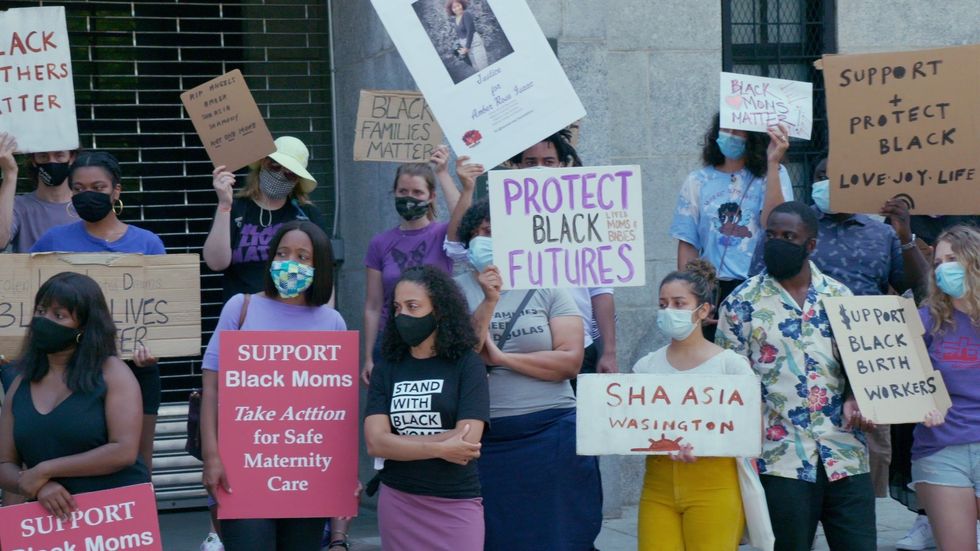
Photo courtesy of Onyx Collective
xoN: What was your experience when you gave birth to your children?
TLL: I appreciate that question. It's interesting. When I gave birth to my children, my daughter is now 27; my son is 25. I didn't know about midwives. So I had a wonderful doctor who was a friend of the family. But even then, I look back with a little frustration because my water broke, I went to the hospital, my family was there, and it was like, 'We can just move this thing along, let's get you on Pitocin get you going,' and I did that and stayed in the hospital overnight. Then the contractions were coming hard, as they do, especially when you're on Pitocin.
They suggested that I have an epidural, which I had. Then, my lips started to numb because they told me I was only supposed to be numb from the waist down. But I was beginning to feel numb over my entire body. I told my anesthesiologist to turn it down, my lips were numb, and she kept saying, 'Well, no, if I turn it down, I have to turn it off, and you're gonna feel pain.' I was like, I need to feel something because I'm now not feeling anything. I had to get nasty with her and didn't want to do it. Because you're laying there, you're vulnerable; I couldn't move. My mother and sister were there, and then they started noticing my oxygen levels were getting weird. I was like, 'You need to turn it off, and I had to get nasty for [the nurse to] finally turn down the anesthesia so that I can at least feel something. Thank God everything was fine, and my daughter was fine. Similarly with my son, a different doctor this time, by the way, both Black women, lovely people, but in a system, right?
With my son, the same thing happened; similarly, my water began to leak, and I was saved in a way by the nurse because at one point I was pushing, and the doctor was like, 'Okay, his umbilical cord is around his neck, his shoulders are stuck,' and she just stopped. The nurse said, 'This may hurt a little bit,' She put her hands on my stomach and pushed my son out. Again, I was fine, thank God, and the children are fine, but in retrospect, I wish I had allowed my body time to do what it wanted to do, and I think I would have been fine. I don't think I needed Pitocin. I don't think I needed the epidural if I had done it that way. But that's the way I did it back then.
But I joke with my daughter that by the time she's ready, I'm ready, and we're going to get it right this time because I don't think that surviving birth is what it should be. I think we should thrive in our births and be able to have beautiful birthing experiences that are not with trauma. And I'm not saying they don't have pain, but I believe that the pain that one goes through is what we're supposed to go through. I don't think women should suffer. But as Helena Grant, the midwife in our film, says that when a woman is birthing a baby, she's not just birthing a baby, she's birthing a mother, and it's a rite of passage that we have to go through to get on that other side. So we are prepared to take care of this young life we've just brought here.
xoN: How can women protect themselves when pregnant or about to give birth in this environment?
TLL: First of all, shop around for your healthcare provider. If you go to a health care provider and you don't connect with them, then keep looking for that health care provider that is right for you. First and foremost, ask as many questions as you can ask. Remember that you're in the power seat, you should be empowered; you're about to go through something amazing. Make sure you get the support you need. No [woman] can be doing everything in the moment of labor and birthing.
So make sure you have the right energy and people around you who can advocate for you and support you the way you need during your birthing process. I was with these people through the process of this documentary. I was able to be up close and personal with people grieving from a loss but activated by the loss. I was able to be up close and personal with people going through the birthing process themselves, trying to figure it out for themselves as well. So it's been quite a journey.
Aftershock is now streaming on Hulu.
Let’s make things inbox official! Sign up for the xoNecole newsletter for daily love, wellness, career, and exclusive content delivered straight to your inbox.
Feature image by Keith Williams



